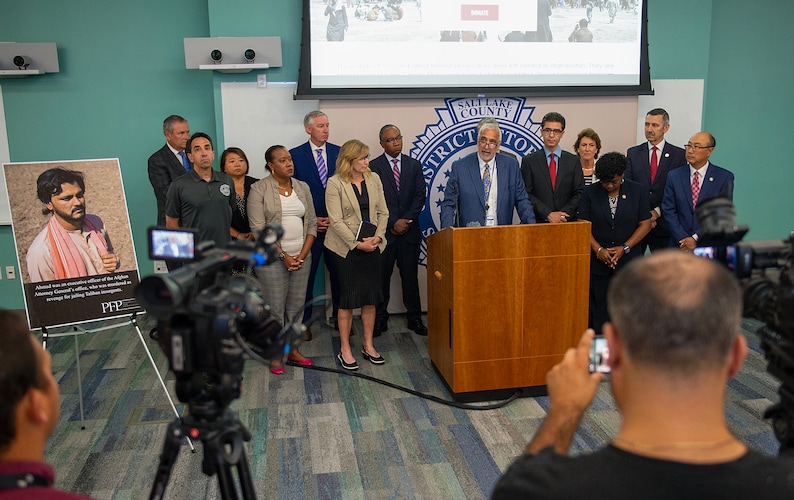Salt Lake County District Attorney Sim Gill is working with prosecutors nationwide to evacuate Afghan law professionals who have been targeted by the Taliban, he announced Thursday.
The Prosecutors for Prosecutors campaign hopes to raise $15 million to rescue 1,500 prosecutors and their families who remain in Afghanistan, and was organized by the U.S. Association of Prosecuting Attorneys. Gill announced the campaign with members of the association’s Major County Prosecutors council, who were gathered at the Salt Lake County district attorney’s office for a summit.
Between October 2021 and February 2022, over 900 Afghan arrivals resettled in Utah. Gill said the district attorney’s office is already collaborating with local organizations including the Utah Muslim Civic League as his team works with the Prosecutors for Prosecutors campaign.
“These are men and women in the Afghan community who were trained by Americans and our principles of rule of law,” Gill said. “... and who then held members of the Taliban accountable for murder, terrorism, assaults, kidnapping, and violence against women. Because they were not directly employed by the United States government, they did not have the special immigration visa when forces left Afghanistan.”

(Chris Samuels | The Salt Lake Tribune) Salt Lake County District Attorney Sim Gill speaks at a news conference about the Prosecutors for Prosecutors campaign.
Over 3,800 prosecutors and key staff members, along with their families, were left behind when the U.S. military withdrew from Afghanistan in 2021, Gill said. Since then, 26 of these prosecutors and some of their family members have been tortured and killed.
The first step is raising funds, Gill said, which will then be distributed to nongovernmental organizations such as the Jewish Humanitarian Response who are already in the area to facilitate evacuations. These organizations also help Afghans who are in hiding with resources including food, health care and safe houses before organizing evacuations.
Afghan prosecutors are not eligible for Special Immigrant Visas to the U.S. because they weren’t directly employed by the U.S. government — and without efforts to expedite processing, these visas can take two to three years, according to the campaign’s website.
“We have been working legislatively, trying to talk to different representatives and senators to figure out, ‘Okay, what can be done?’” said Nichole Parisi, chief operating officer of the Association of Prosecuting Attorneys.
“Two years, that’s just not the time we have to afford,” she continued. “... Organizations are utilizing funds to be able to go in and get people out, get them to a safe place, and then we can go through the process of relocating them here permanently, if needed.”
(Chris Samuels | The Salt Lake Tribune) Afghan prosecutor Yama Rayeen receives support from prosecutors from across the U.S. at a news conference in Salt Lake City announcing a fund to bring prosecutors and their families out of Afghanistan, Thursday, July 27, 2023.
Even before the Taliban’s takeover, hundreds of prosecutors in Afghanistan were the victims of targeted attacks, former Afghanistan prosecutor Yama Rayeen said.
Rayeen, who moved to the U.S. in 2016, worked with the Department of Justice’s Rule of Law project in Afghanistan for 20 years. He’s still in close contact with his colleagues who remain in the country, especially those who are in hiding — and out of the 1,500 prosecutors the campaign aims to rescue, Rayeen said he’s talked with most of them.
“Whenever you raise your voice against the Taliban and their extremist ideologies... it is very critical, and it’s very dangerous,” Rayeen said.
“But since I’m doing right, and I know I am raising the voice of those victims who cannot raise their voice in Afghanistan — it may take a toll from me and my family, but if we keep quiet,” he continued, “the hunting of the prosecutors by the Taliban is going to last more and more.”







